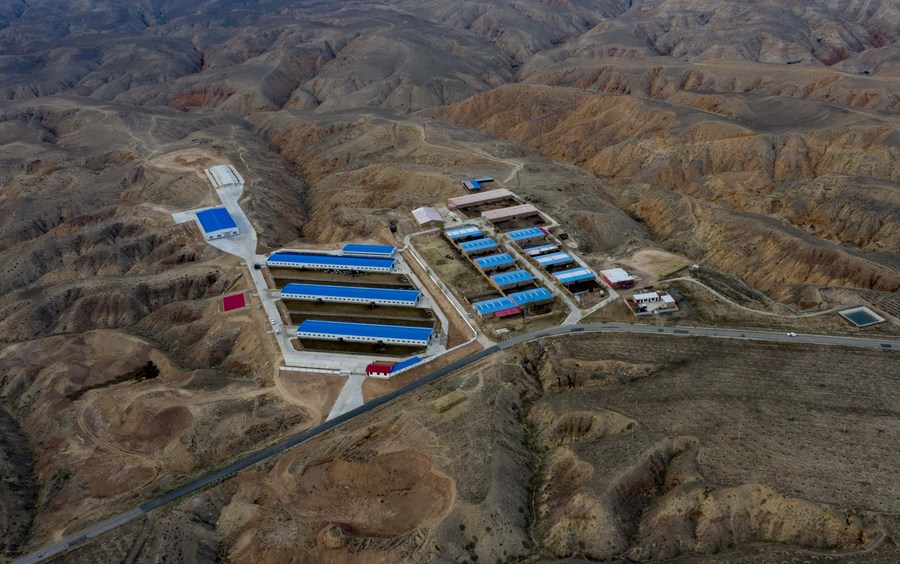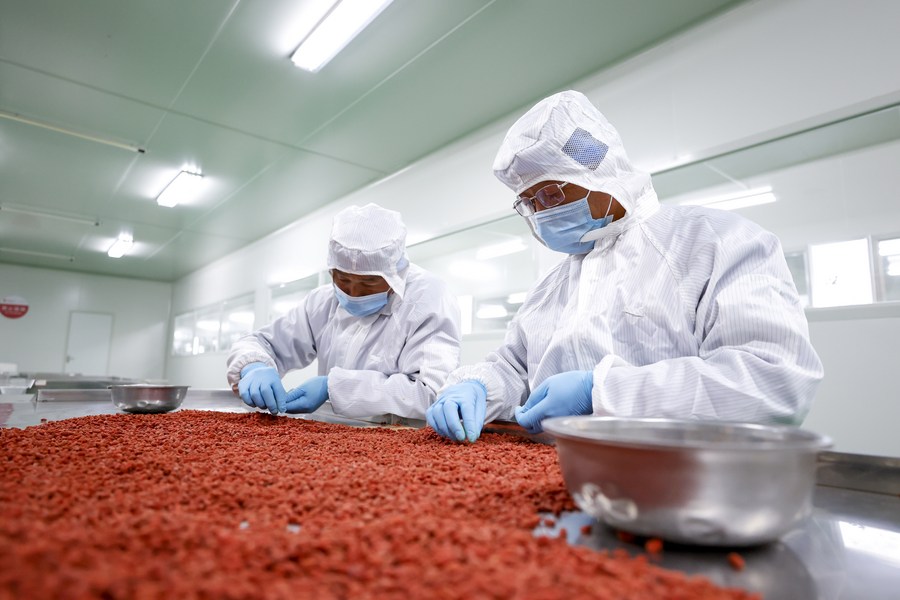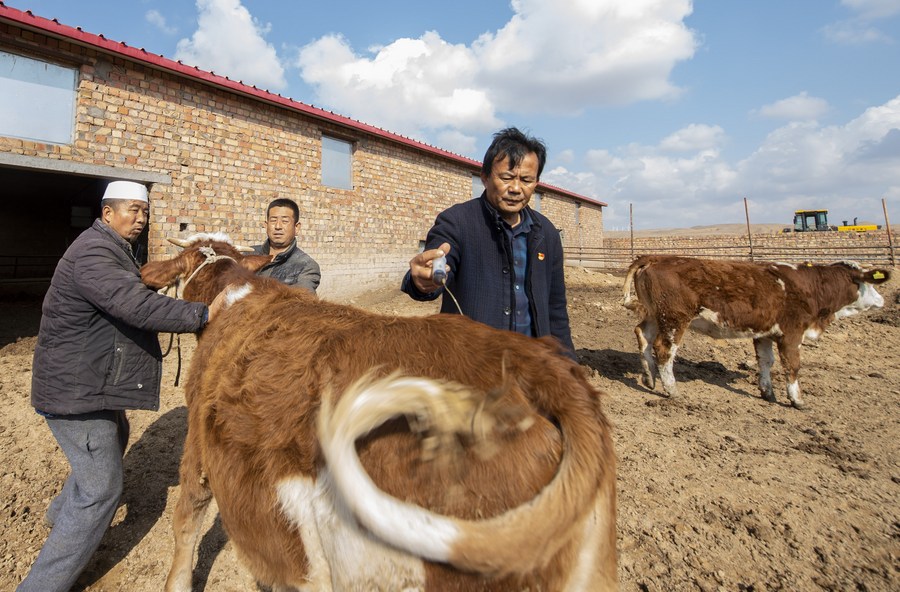-- American journalist Edgar Snow devoted nearly a third of his classic "Red Star Over China" to Yuwang, what is today known as Tongxin County in northwest China's Ningxia Hui Autonomous Region. The book gave a rare and detailed account of the Chinese revolution in the 1930s.
-- In the book, Snow was deeply impressed by disciplined Red Army soldiers as well as their respect for the customs of the local Muslims.
-- As the Communist Party of China embraces its centenary this year, more than 380,000 residents in the county are also celebrating their farewell to absolute poverty and a promising future of prosperity.
YINCHUAN, June 4 (Xinhua) -- More than 80 years ago, American journalist Edgar Snow penned "Red Star Over China," which gave a rare and detailed account of the Chinese revolution in the 1930s.
He devoted nearly a third of the book to Yuwang, what is today known as Tongxin County in northwest China's Ningxia Hui Autonomous Region.
Snow in his book recounted the cancellation of exorbitant taxes and levies and chronicled the lives of hard-working and disciplined Red Army soldiers as well as their respect for the customs of the local Muslims.
As the Communist Party of China (CPC) embraces its centenary this year, more than 380,000 residents in the county are also celebrating their farewell to absolute poverty, ever more harmonious relations among various ethnic groups, and a promising future of prosperity.

Aerial photo taken on Sept. 18, 2020 shows the People's Hospital in Tongxin County, Wuzhong, northwest China's Ningxia Hui Autonomous Region. (Xinhua/Feng Kaihua)
FIGHT AGAINST POVERTY
Yuwang was marred by extreme poverty under the rule of Kuomingtang until the Red Army came. Snow writes: "In one district investigated it was found that over 70 percent of the farmers were in debt, and about 60 percent were living on food bought on credit."
"The Red Army fought for the poor," 70-year-old Yang Zhenhua's grandfather once told him. According to Yang, his grandfather and fellow villagers, out of fear, went into hiding before the arrival of the Red Army. But they soon discovered that the soldiers had neither taken a needle or thread from them nor damaged the crops in the fields.
"My grandfather praised them, calling them really a good army of the people," Yang said.

Aerial photo taken on Nov. 7, 2019 shows an animal farm in Hantianling Village of Tongxin County, Wuzhong, northwest China's Ningxia Hui Autonomous Region. (Xinhua/Yang Zhisen)
Located in Xihaigu, considered one of the world's most uninhabitable places due to the harsh environment, Tongxin achieved a historic feat in eliminating absolute poverty.
Over the decades, Yang had struggled to support his bed-ridden wife and five children by working the fields from dawn to dusk, with droughts often destroying a year's harvest.
In 2014, his family was listed as a poverty-stricken household. With the support of the government poverty alleviation funds of 8,000 yuan (about 1,250 U.S. dollars), he raised 10 sheep. Thanks to the annual breeding subsidy, the number of sheep owned by Yang has now increased to 30.
Snow once took a photo by standing on the earthen wall of Yang's courtyard. Yang's cave houses have long been abandoned and his family moved into a modern new house with red walls and white tiles.
Yang's family was among the more than 100,000 poverty-stricken Tongxin residents who shook off poverty. In addition to better education, healthcare and infrastructure, the per capita disposable income of farmers in the county increased from 6,000 yuan in 2014 to 11,000 yuan at the end of last year.

Employees work at Goji berry processing workshop in Tongde Village of Tongxin County, Wuzhong, northwest China's Ningxia Hui Autonomous Region, Oct. 23, 2020. (Xinhua/Feng Kaihua)
RED SPIRIT
In the "red town," once a battlefront of the Red Army's operations, Snow marveled at the sturdiness of the soldiers. "Sheer dogged endurance, and ability to stand hardship without complaint, the Chinese peasants, who composed the greater part of the Red Army, were unbeatable."
What boosted the Red Army's extraordinary fight was the lofty belief of creating a bright future of equality and prosperity for all.
Ding Jianhua, Party chief of Hantianling Village under the county, cashed in all his family property and savings to build a cattle farm for his fellow villagers to use free of charge. He even became a self-taught vet to take care of all cattle in the village.
The number of cattle in the village has grown from six in 2013 to more than 3,000 now. Incomes of villagers have increased tenfold in a decade.
"My goal is to ensure that every family in the village can live in a new house and own a car," Ding said.

Ding Jianhua (1st R), Party chief of Hantianling Village and a self-taught vet, treats cattle in Tongxin County of Wuzhong, northwest China's Ningxia Hui Autonomous Region, Nov. 7, 2019. (Xinhua/Yang Zhisen)
With the improvement of water, electricity, road and internet infrastructures in rural areas, more and more young people have chosen to return to their hometowns, becoming a vigorous force for rural development.
Zhang Zhifei returned to his native village of Nanyuan as soon as he graduated from college to lead villagers in raising chickens scientifically.
Flocks of chickens can be seen pacing for food while listening to dynamic music at his farm.
"Regular exposure to music reduces the stress response and mortality in chickens," Zhang said.
Eight households in the village took up poultry farming with his help, raising an average of 3,000 chickens.
The first month of breeding is crucial. Zhang goes into the hennery every two hours, day and night, to check the temperature, humidity and growth of chickens.
"It is not difficult at all compared to the Red Army's Long March," he said.
(Video reporters: Ma Lijuan, Zhang Liang and Tang Yameng; Video editor: Lin Lin) ■




